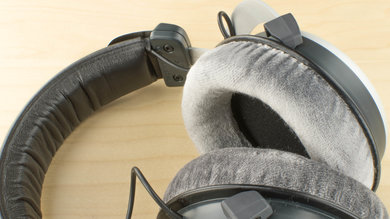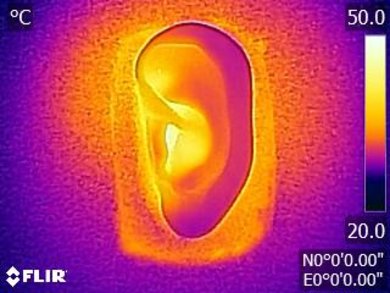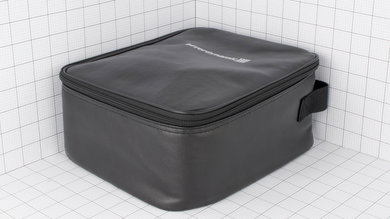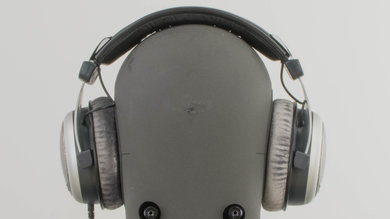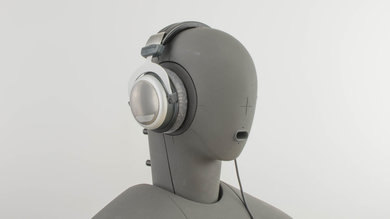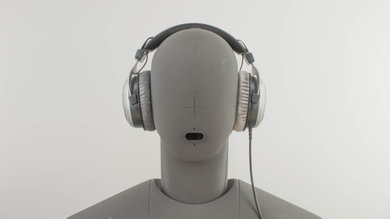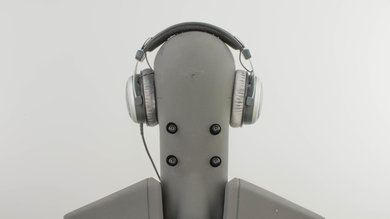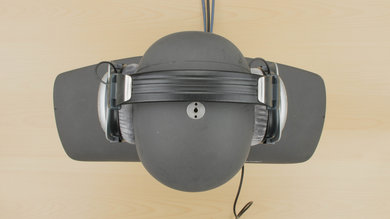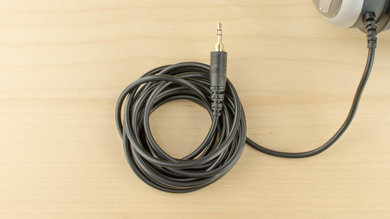Our Verdict
The DT 880 have an excellent Mid range and an above-average Bass and Treble. This makes them sound decently well balanced, with instruments and vocals that don't feel pushed back or too forward on most tracks. However, their overall audio reproduction is a little bright and sibilant. They also do not have as much Bass as the DT 990, but on the upside, they have a spacious Soundstage, low harmonic distortion and great stereo image, which makes them good headphones for neutral listening.
- Great audio reproduction.
- Sturdy build quality.
- Very sensitive to ambient noise, by design.
- Bulky and unstable design.
Poor for commuting. They have a semi-open design which lets a lot of ambient noise seep into the ear cups which is not ideal for the loud environments involved in commuting via public transit.
- Great audio reproduction.
- Sturdy build quality.
- Very sensitive to ambient noise, by design.
- Bulky and unstable design.
Not made for sports. They're bulky, cumbersome to carry around and unstable. They also don't have any controls.
- Great audio reproduction.
- Sturdy build quality.
- Very sensitive to ambient noise, by design.
- Bulky and unstable design.
Sub-par for office use. Unless you work in an isolated environment, the level of leakage of these headphones may distract those around you. They also do not block any noise so they won't be suitable for a lively workplace.
- Great audio reproduction.
- Sturdy build quality.
- Very sensitive to ambient noise, by design.
- Bulky and unstable design.
- Great audio reproduction.
- Sturdy build quality.
- Very sensitive to ambient noise, by design.
- Bulky and unstable design.
Changelog
- Updated Oct 26, 2021: Converted to Test Bench 1.5.
- Updated Mar 02, 2020: Converted to Test Bench 1.4.
- Updated Nov 21, 2019: Converted to Test Bench 1.3.1.
- Updated Nov 21, 2019: Converted to Test Bench 1.3.
Check Price
Popular Headphones Comparisons
The Sennheiser HD 599 and the Beyerdynamic DT 880 are both great critical listening headphones if you like a neutral sound, but they have different sound profiles. The Sennheiser sound warmer, but also muddier, while the Beyerdynamic have a brighter but also harsher sound. The Sennheiser are also more comfortable for longer listening sessions, but the Beyerdynamic feel much more durable.
The Beyerdynamic DT 990 PRO and the Beyerdynamic DT 880 PRO are both very good headphones for audiophiles, but they have different sound profiles. Both headphones have a bright and clear treble. However, the DT 880 lack bass compared to the DT 990 PRO, which pack a stronger punch. This makes the DT 880 sound brighter compared to the DT 990, which can sound more balanced overall. Both headphones also sound rather sharp, but the intensity depends on how sensitive you are to the higher frequencies.
The Beyerdynamic DT 880 and the Beyerdynamic DT 770 PRO are similarly performing headphones for critical listening. The DT 880's semi-open design creates a slightly more open sound. They're also more comfortable and have a more consistent frequency response. However, the DT 770 PRO have a more even sound profile overall, provided you achieve a good fit, and they leak less sound.
Whether the Sennheiser HD 560S are better than the Beyerdynamic DT 880 depends on your tastes and priorities. The Sennheiser can be used without a headphone amp and are much more stable on your head. On the other hand, the Beyerdynamic have a significantly better build quality and come with a soft case to protect them from minor scratches and splashes. However, they need an amp to drive them.
Test Results

The DT 880 look similar to the DT 990 PRO but have enough unique touches to feel like a different design. The circular ear cups are semi open as opposed to the open design of the DT 990 which combined with the more premium, metal enclosures makes the DT 880 look much more expensive than their price range. They also have a slightly different headband design with two small metal plates at the hinges, which look a bit odd but shouldn't be much of an issue once they're on your head.
The DT 880 are comfortable headphones but put an uneven amount of pressure around your ears. The ear cup padding is covered with a soft microfiber fabric that feels good on the skin. They're also not as tight as DT 990 out of the box, but unfortunately, the angle of ear cups causes them to put an uncomfortable amount of pressure between your jaw and your ear lobe which can get a bit tiring after having them on for a while.
Like the DT 990 PRO and the DT 770, the DT 880 are not very portable headphones. They're bulky, they don't fold into a more compact format, and the ear cups don't lay flat either. This makes them quite cumbersome to carry on your person without a bag. Unfortunately, the provided carrying case adds so much bulk that they may not even fit into your backpack or gym bag.
Comes with a soft case that will shield the headphones against scratches and minor water damage. It also protects them against some impacts but because it's a soft case it won't be ideal against accidental drops. Unfortunately, the case almost doubles the amount of space that they would take up in your bag. This makes them even less portable which is slightly disappointing.
The DT 880 are rugged and well-built headphones that won't break if they accidentally fall off your desk. They also make use of some premium materials in their build quality. Their frame doesn't feel as sturdy as the DT990 PRO, but the ear cups feel better built and have metal enclosures compared to the plastic one of the DT990. However, the audio cables leading to the ear cups are a little exposed.
These headphones, unlike the DT990, are not stable. They fit a bit looser on the head when compared to the 990s and will easily fall off if you shake them too much. They're not meant to be used while exercising or running, and the non-detachable cable is cumbersome and will yank the headphones off your head if it gets hooked on something.
Excellent consistency. The semi-open enclosures of the DT-880 mean they don't rely heavily on an air-tight seal to create their Bass. Therefore, they tend to perform quite consistently, even though the Bass Range of our Over-Ear and On-Ear headphones are measured on 5 different human subjects, 5 times each.
Decent Bass Range performance. The DT-880 suffer from insufficient low-bass and bass. Consequently the low-frequency extension point is at 92Hz which is poor. The resulting sound will not have enough kick and low-end rumble for the fans of Bass. The DT 990 PRO would be a better choice.
Excellent Mid Range performance. The response is virtually flawless and within 0.7dB of our target.
Decent Treble Range performance. Low-treble is well-balanced, but treble is over-emphasized by an average of 5dB, peaking at 12dB around 9KHz. This makes the sound of the Treble on these headphones noticeably bright, and they could sound a bit harsh on overly bright tracks.
Poor Isolation. The DT-880 is rated as semi-open but their performance is very similar to fully open-back headphones, and therefore don't isolate well. They provide no isolation in the Bass and Mid Ranges. In the Treble Range, they achieve an average of 15dB of reduction which is about average.
Poor Leakage. Due to their semi-open back design, these headphones leak a considerable amount of sound. The significant portion of their leakage sits between 300Hz and 20KHz, which is quite a wide range. The overall level of leakage is also loud.


